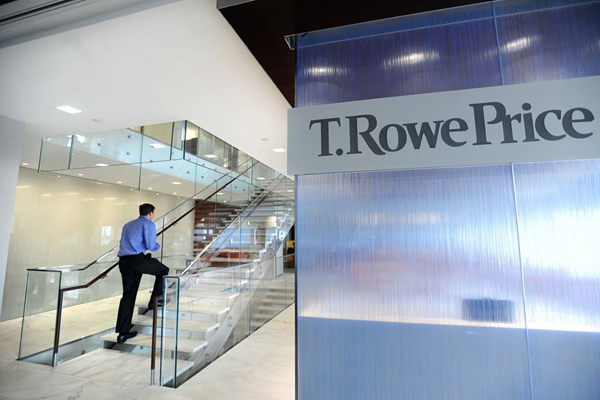|
THE
WALL STREET JOURNAL.
Markets
T. Rowe Price Pays Up for Botched Vote
Firm will compensate fund clients who lost out when it
accidentally voted in favor of the 2013 buyout of Dell
|

T. Rowe Price inadvertently voted in favor of the 2013
management buyout of Dell, even though it was a vocal opponent
of the deal. PHOTO: ALGERINA PERNA/BALTIMORE SUN |
By
Sarah Krouse
Updated June 6, 2016 6:56 p.m.
ET
One of America’s largest
mutual-fund companies will pay $194 million to clients as compensation
for a proxy-voting blunder, a rare level of atonement in the
money-management world.
T. Rowe Price Group
Inc.
said thousands of customers will see a
boost in the value of their portfolios as a result of the payments,
which are designed to reimburse investors for a miscue that occurred
during Dell Inc.’s management buyout in 2013.
The Baltimore money
manager inadvertently voted in favor of, rather than against, the
buyout, even though it was a vocal opponent of the deal. The firm
argued at the time that the deal undervalued Dell’s shares.
T. Rowe Price will take a
second-quarter charge equivalent to the $194 million routed to its
funds and investor accounts, the company’s largest ever one-time
deduction from earnings. The scale of the payment and the
circumstances are unusual for a mutual-fund company, according to
analysts.
Chief Executive William
Stromberg said the fund firm is “rock solid” financially and that it
would make the payments from its available cash. T. Rowe Price had
$1.9 billion in cash and discretionary investments at the end of
March. The company manages $764.6 billion in assets. The firm has no
debt and will remain that way, a spokesman said.
Analysts said the company
is among the publicly traded asset managers with the strongest balance
sheet. But in the short term the charge could disappoint some
shareholders because excess cash can be used for share buybacks, deals
or other investments, they said.
“It does affect the brand
a little bit, but that is offset by the notion that they are making
good by their clients,” said William Katz, an analyst at Citigroup
Inc.
No shareholders are
receiving cash as part of this deal. Instead, T. Rowe Price’s remedy
will result in a relatively small performance bump for affected
portfolios because of the number that held shares and their size.
The payments will go to
four U.S. mutual funds, one overseas fund, two trusts and about a
dozen other institutional client accounts. The
T. Rowe Price Equity Income Fund,
which had about $22 billion in assets at the end of April, is the
largest of the funds that will receive compensation. The payments will
have the biggest impact on the $3.4 billion
T. Rowe Price Science & Technology Fund
because it holds a higher number of Dell shares as a percentage of its
total assets.
Russel Kinnel, an analyst
at research firm Morningstar Inc., said the impact “is really only
meaningful” at the Science & Technology Fund, in which the payment
will increase the fund’s net asset value by about 1.2%.
T. Rowe Price said it
would pay the amounts immediately, and the contributions would be
reflected in the funds’ next respective net-asset-value calculations,
which take place after the market closes. Many clients will be able to
see the changes by logging onto brokerage or other accounts Monday
night or Tuesday morning, a spokesman said.
Administrative errors
during the proxy voting process led to T. Rowe Price’s 2013
mistake. The default stance of T. Rowe in merger votes, like many of
its large peers, is to support management, which in Dell’s case meant
voting in favor of the deal.
T. Rowe Price’s
computerized voting system gave instructions to vote “yes” that
weren’t manually overridden before the final vote, according to court
filings. The company launched a review of its internal voting
procedures, The Wall Street Journal reported last week.
The mistake disqualified
T. Rowe Price from suing for more money.
Other investors
successfully sued and won compensation from a judge last week, who
said
Michael Dell and his partners
underpaid by about $6 billion. The firm said Monday that the judge’s
decision last week validated its investment thesis.
Few of the Dell investors
are eligible for compensation due to the intricacies of the law in
Delaware, where the suit was filed.
All told, a handful of
former shareholders who challenged the deal will get about $35
million, including interest. Hedge fund Magnetar Capital LLC stands to
collect about $25 million.
T. Rowe Price’s funds and
accounts owned about 31 million shares in Dell at the time, and the
firm said the $194 million charge represents the difference in the
share-price valuations plus interest.
“Since this situation
began, our focus has been on securing fair value from the Dell buyout
for our clients,” Mr. Stromberg said, adding that “clients will come
out ahead as compared with how they would have fared had they taken
the merger consideration.”
Write
to
Sarah Krouse at
sarah.krouse@wsj.com
|